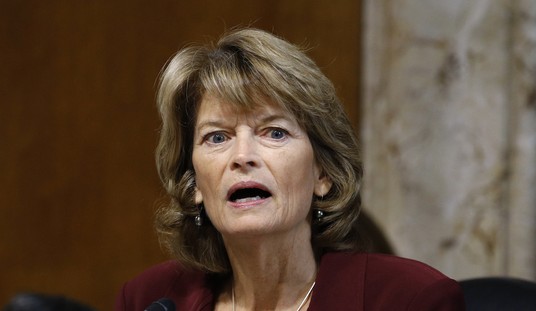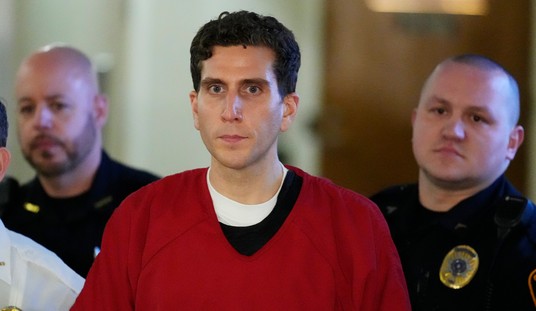Alternate headline: Catholic Church remains Catholic. After several years of speculation over Pope Francis’ position toward same-sex marriages, the Vatican — with Francis’ approval — issued a clear statement on the issue. The Catholic Church cannot bless these unions, the Congregation for the Defense of Faith announced, as God “cannot bless sin”:
The Vatican’s orthodoxy office, the Congregation for the Doctrine of the Faith, issued a formal response Monday to a question about whether Catholic clergy can bless gay unions.
The answer, contained in a two-page explanation published in seven languages and approved by Pope Francis, was “negative.”
The decree distinguished between the church’s welcoming and blessing of gay people, which it upheld, but not their unions since any such sacramental recognition could be confused with marriage.
The Vatican holds that gays must be treated with dignity and respect, but that gay sex is “intrinsically disordered.” Catholic teaching holds that marriage, a lifelong union between a man and woman, is part of God’s plan and is intended for the sake of creating new life.
Since gay unions are not intended to be part of that plan, they cannot be blessed by the church, the document said.
If one reads Catholic teaching on marriage and sexual continence otherwise, this should be rather obvious. So who asked? Plenty of people, actually, beginning with the 2014 Synod on the Family, from which I reported that the media’s focus on same-sex unions missed the point. At that time, the media assumed that Pope Francis’ “conciliatory language” toward gay and lesbian couples signaled that the new pontiff wanted to liberalize its teachings on marriage, rather than simply demanding enough respect for dialogue on the Gospel.
In fairness, however, it wasn’t just the media asking those questions. Today’s announcement was prompted by a dubium, a formal request for clarification within the church of the position on an issue, reports Crux’s Ines San Martín. The remarks over same-sex unions created enough confusion to require a final clarification of church teaching, especially with some bishops — notably in Germany — advocating for blessing same-sex marriages:
The document, signed by Spanish Jesuit Cardinal Luis Ladaria and approved by Pope Francis, was releaseMonday, together with an explanatory note that clarifies that the statement comes as a response to a question, also known as a dubium, submitted by pastors and faithful requesting clarification and guidance concerning an issue that might pose controversy.
The note ads that the purpose of the CDF’s answer is to “is to help the universal Church to respond better to the demands of the Gospel, to settle disputes, and to foster healthy communion among the holy people of God.”
The statement doesn’t specify who posed the dubium, though in recent years there’s been pressure for some sort of same-sex blessing ceremony in some corners. German bishops, for example, have urged a debate on the blessing of gay couples.
In fact, this might be an attempt to head off the German bishops before they develop a full head of steam at their own synod. The Wall Street Journal’s Francis X. Rocca notes the timing:
The document reaffirms Catholic teaching on marriage and sexuality when several liberal bishops, including the head of the German Catholic bishops’ conference, have called for blessing same-sex couples in committed relationships. Priests in Germany have widely blessed such couples for years, as have clergy in some other parts of Northern Europe.
German bishops have tangled with the Vatican on other matters, including the question of giving Communion to Lutherans, and are unlikely to back down in their stance on blessing gay unions. German bishops and lay Catholics are currently involved in a national synod that is considering changes to aspects of church life, including the possibility of women clergy and teaching on sexuality.
The Vatican has a word for such practices: Protestantism. And even though these questions continue to be asked, it is not as if Francis has not answered them in the past. Back to Crux:
If such blessings do occur, the CDF document argues, they cannot be considered “licit,” because, as Pope Francis wrote in his 2015 post-synodal exhortation on the family, Amoris Laetitia, there are “absolutely no grounds for considering homosexual unions to be in any way similar or even remotely analogous to God’s plan for marriage and family.”
The response also notes that the Catechism of the Catholic Church states: “According to the teaching of the Church, men and women with homosexual tendencies ‘must be accepted with respect, compassion, and sensitivity. Every sign of unjust discrimination in their regard should be avoided’.”
The note also says that the fact that these blessings are considered unlawful by the Church does not intended to be a form of unjust discrimination, but a reminder of the very nature of the sacramentals.
Read the Vatican’s response to the dubium in English at this link. It emphasizes that this teaching does not preclude blessings on gays and lesbians who wish to live within the church’s teachings, which in this case would mean celibacy. This bar only relates to blessing on same-sex marriages:
The answer to the proposed dubium does not preclude the blessings given to individual persons with homosexual inclinations[10], who manifest the will to live in fidelity to the revealed plans of God as proposed by Church teaching. Rather, it declares illicit any form of blessing that tends to acknowledge their unions as such. In this case, in fact, the blessing would manifest not the intention to entrust such individual persons to the protection and help of God, in the sense mentioned above, but to approve and encourage a choice and a way of life that cannot be recognized as objectively ordered to the revealed plans of God[11].
At the same time, the Church recalls that God Himself never ceases to bless each of His pilgrim children in this world, because for Him “we are more important to God than all of the sins that we can commit”[12]. But he does not and cannot bless sin: he blesses sinful man, so that he may recognize that he is part of his plan of love and allow himself to be changed by him. He in fact “takes us as we are, but never leaves us as we are”[13].
For the above mentioned reasons, the Church does not have, and cannot have, the power to bless unions of persons of the same sex in the sense intended above.
That is the same message the Synod on the Family delivered too, but the media and some bishops apparently didn’t listen carefully enough. The question now will be whether the media and some bishops will listen this time, especially to the nuance of the statement, or just leap to the conclusion — again — that Francis got pushed around by the establishment. My guess is that the media’s Francis-o-meter will tilt again from New Enlightenment Prophet back to Old Patriarchy for quite a while.







